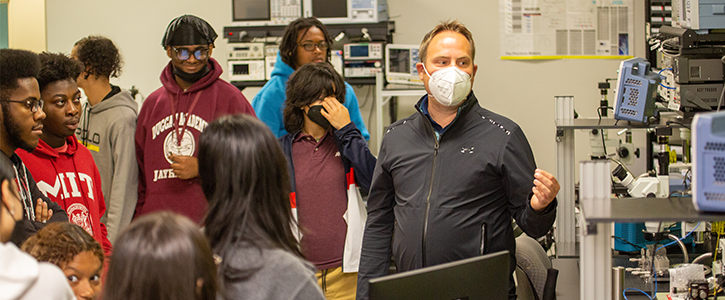Western New England University and Spark Photonics Foundation are pleased to announce they have received $279,681 from the Massachusetts Executive Office of Education to lead STEM outreach activities across the Commonwealth. Specifically, the activities will introduce middle and high school students and teachers to advanced manufacturing and integrated photonics (the use of light for applications traditionally tackled by electronics), through various hands-on experiments and project-based learning modules including Spark Photonics Foundation's flagship program SparkAlpha.
In SparkAlpha, students identify real-world problems that are important to them and then address those problems by conceptualizing photonics-based products. The next step of the program has students create business plans around their products and pitch their ideas to a panel of representatives from education and industry. As part of SparkAlpha, students also take field trips to local college and industry partners to see and hear firsthand what education and career opportunities exist in advanced manufacturing.
"We are proud to partner with Spark Photonics through this industry-aligned opportunity that will prepare our students for the future of work," said WNE President Robert E. Johnson. "Our collective responsibility is to help students be adaptive, nimble, and entrepreneurial with a value-creation orientation. This initiative is a prime example of how universities and industry can work together to build the foundation for a strong, diverse workforce."
The grant also funds professional development workshops for teachers to learn more about optics and photonics, and to transfer their learnings back to their classrooms to give students an understanding of how their education ties into advanced technologies. As part of their professional development, teachers will take part in a workshop on the WNE campus led by Professor Steve Adamshick that demonstrates how traditional optics and photonics can be shrunk down to the nanoscale using cutting-edge semiconductor processes. WNE will use integrated photonic chips designed by Spark Photonics and fabricated by AIM Photonics (Albany, NY) to demonstrate state-of-the-art advanced manufacturing technology to teachers and students alike.
"We are extremely proud to partner with Western New England University to bring this project-based nanotechnology entrepreneurship program to underserved communities in Massachusetts; this is a differentiator for the university and the Commonwealth," said Spark Photonics Foundation Executive Director Kevin McComber. "It is a rare opportunity for middle and high school students to not only be exposed to the latest in semiconductor technology, but also to think about how that technology actually gets translated into marketable products, all as part of their classroom curriculum."
WNE has a rich tradition of working with the Springfield area public schools to provide different programs and internship opportunities for students. Specifically, WNE and Duggan Academy have worked together on many STEM outreach activities including a summer robotics camp hosted by WNE ECE Department Chair Neeraj Magotra for the past several years. "We are delighted to expand our engagement with Springfield area public schools using the new and exciting technology brought to the table by Spark Photonics Foundation," said Magotra.
The effort is part of a broader outreach program by the Baker-Polito Administration who awarded more than $1 million in grants to higher education institutions and nonprofit partners to expand STEM learning opportunities for students through hands-on curriculum and teacher professional development, which will impact nearly 30,000 students in low-income school districts and support more than 450 teachers.
"In Massachusetts, STEM industries are thriving, and we must support the development of a skilled talent pipeline and provide more students with skills and knowledge in science, technology, engineering and math that will lead them toward rewarding careers," said Governor Charlie Baker. "Lt. Governor Polito and the STEM Advisory Council have worked diligently to expand access to STEM learning to all students across the Commonwealth, and these grants will continue those critical efforts."
"We remain committed to expanding STEM education opportunities to students at all grade levels so that learners of all ages can see themselves in engaging STEM careers," said Lt. Governor Karyn Polito, co-chair of the STEM Advisory Council. "These programs give students an opportunity to see how their lessons are applied outside of the classroom, which hopefully inspires them to pursue further study for careers in growing STEM industry sectors."
"These STEM programs provide teachers with valuable training and resources to ensure students are engaged with their lessons. These programs create invaluable experiences for students before they go on to higher education or careers," said Secretary of Education James Peyser. "We are very appreciative of the higher education institutions and curriculum partners that work along with us to expand STEM learning opportunities for all students."
"As a New Traditional University, WNE embraces a distinctive and innovative institutional model that is responsive to the future—which includes creating a clear pathway for the next generation of engineers. Our mission is to educate young people today for jobs of the future," said Dr. Johnson.
The WNE-Spark program kicked off in Springfield in April 2022 and will expand to additional cities in Massachusetts in the Fall 2022 and Spring 2023 semesters.





